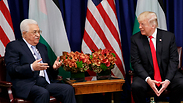
Abbas and Trump meet in 2017
צילום: AP
The Palestinians' automatic 'no' to peace
Opinion: While the Palestinians are at one of the lowest points in their history, it's hard to understand why they are so quick to reject Trump's 'deal of the century' out of hand, even before hearing its details.
Even with a forensic examination of Palestinian discourse, from newspapers to social media, it is difficult to find a significant voice that doesn't completely reject US President Trump's "deal of the century." The Palestinians don't even know what they're rejecting so passionately, as the contents of the Trump administration's peace plan remain vague—even after the TV interview with Jared Kushner earlier this week. Us Israelis, meanwhile, are so used to the Palestinian intransigence that we don't even stop to ask: Why?
Even if you take into account the overt pro-Israeli leanings of the American administration—which reached new heights with the move of the US Embassy to Jerusalem—it's hard to understand how a people, who are at one of the lowest points in their history and essentially living off hand-outs, summarily dismiss the opportunity to hear a proposal that might significantly improve their condition, even if it's only for tactical reasons.
This is of course not the first time the Palestinians have said "no," but one would at least expect some form of serious discussion about the matter, given their situation. The Palestinian people have been chronically divided for almost 12 years; the two demi-states—run by Hamas in Gaza and Fatah in the West Bank—are weak, poor, drifting apart, and both, in one form or another, have agreements of "calm for money" with Israel.
The Palestinian issue—once at the heart of Arab political discourse in our region—has been pushed to the margins. Mahmoud Abbas might still be able to extract a promise out of the elderly Saudi king not to go "behind the Palestinians' backs," but the entire world knows about the business his son conducts with Israel. The Arab world has a hard time understanding what the Palestinians want, and why they allow themselves to continue managing their affairs in such a failed manner.
"If you want to free all of Palestine—ahlan wasahlan ('welcome'), but you need to unite. If you want a state alongside Israel, why do you keep saying 'no' again and again when offered one?" one Egyptian TV anchor wondered.
Since automatic Palestinian refusal is a given, what exactly motivates Jared Kushner, Trump's point man on the peace process? Is he still hoping the Palestinians change their minds when they learn the details of the plan? Probably not. He didn't even bother giving an interview to a Palestinian media outlet, and instead directed his comments to the Arab world, mostly the Gulf nations (Sky Arabic, to which he gave the interview, is funded by the United Arab Emirates). In other words: he's thinking about the day after the Palestinian "no," when Arab countries could come to them and say: "You once again rejected a generous proposal, we won't remain hostages to your intransigence."
It seems farfetched, but work preparing the Arab street for relations with Israel that could be defined as "on the scale of normalization" has been going on for a few years.
"If the Palestinian leadership used the money donated by the Arabs since 1948 for Palestine, it would've already built 50 cities like Tel Aviv, 40 cities like Dubai and 30 cities like Riyadh," tweeted an Iraqi journalist this week —and got a shower of likes.











